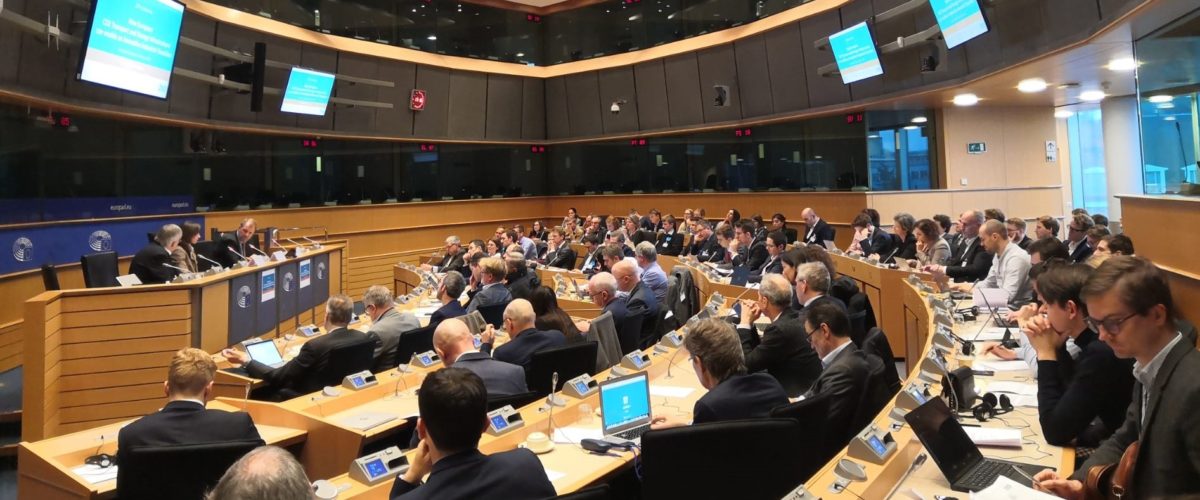ZEP Conference on CO2 Transport and Storage Infrastructure
On 28 January, the Zero Emissions Platform organised a conference on “How European CO2 Transport and Storage infrastructure can enable an innovative industrial transition” at the European Parliament.
The conference was hosted by Tom Berendsen MEP (EPP, NL) and Jens Geier MEP (S&D, DE).
The conference was well attended with a turnout of almost 100 participants from the EU institutions and the CCS community. A link to the full programme can be found here.
During his opening remarks, Tom Berendsen (EPP, NL), MEP host, confirmed that CCS technologies have gained a strong political momentum and he gave an update on the ongoing discussions at the European Parliament around the European Green Deal (EGD).
The event started off with a panel discussion, preceded by an interview between Dr Graeme Sweeney, Chairman of ZEP, and Hans van Steen, Director for Renewables, Research and Innovation, Energy Efficiency, DG ENER, European Commission.
The main takeaways from the interview are
- The discussion around CCS has clearly permeated the political economy. There is no longer a discussion around the reliability of the technology and its safety – in fact, it is now clear that CCS will be essential for Europe to reach net-zero GHG emissions by 2050, supporting the industrial decarbonisation of European regions and enabling the production of low-carbon hydrogen;
- Member states play a key role in the large-scale deployment of the technology and National Energy and Climate Plans are a powerful tool in this respect;
- Revisions of European regulations like TEN-E is necessary to ensure that CCUS projects in Europe are encouraged, financed and supported at all levels;
- It is important not to lose track of the holistic approach when describing the value of a CCS project. “What we need is a clear commitment to arrange an infrastructure available on a common access basis on a known tariff for a long period of time attached to CO2 capture assets”.
The panel discussion, moderated by energy and climate journalist Sonja van Renssen, touched upon the social implications of the industrial transition. Benjamin Denis (IndustriALL) called for a social agenda which would ensure “opportunities to incentivise industrial regions to better identify industrial decarbonisation pathway and strategy. There needs to be a regional balance between industrial innovation, decarbonisation and cohesion”.
Speaking on behalf of European CCS projects, Porthos and Northern Lights, Mark Driessen (Port of Rotterdam/Porthos) and Per Sandberg (Equinor) analysed their respective contexts, providing details on the next steps and deadlines. They both noted the need for a positive narrative around CCS projects, as well as the need to engage with politicians, to boost confidence in the projects and to ease the access to funding opportunities at national and European levels. Henry Smyth (Ervia) highlighted the benefits unlocked by a CO2 transport and storage infrastructure and the many possibilities for decarbonisation that CCS offers.
Rob van der Meer (HeidelbergCement) highlighted that engaging with the European institutions is key to keep CCS high on the political agenda. This was echoed by Haitze Siemers (DG ENER), who provided an overview on the funding opportunities to support a CO2 transport and storage infrastructure and reiterated that investments in energy and climate are costly, but future-oriented, therefore essential. The panel was closed by the remarks of MEP Jens Geier, who recalled the importance of an inclusive industrial transition for European regions.
Nine European CCUS projects showcased their work during the second part of the event, highlighting good practices, challenges, cost and regulatory barriers, upcoming developments and ongoing work. All presentations can be downloaded at this link.
- Northern Lights, presented by Emil Yde Aasen (Equinor)
- PORTHOS, presented by Mark Driessen (Port of Rotterdam)
- ERVIA, presented by Brian Murphy (ERVIA)
- ATHOS, presented by Afkenel Schipstra (Gasunie)
- LEILAC, presented by Daniel Rennie (CALIX)
- Acorn Sapling CCS Project, presented by Steven Murphy (Pale Blue Dot)
- CCU – Power-to-methane, presented by Daniel Marenne (ENGIE)
- CCU – Power to liquid hydrocarbons, presented by Hergen Thore Wolf (Sunfire)
- A presentation on “Finding CO2 to capture and store in Europe” by Valentin Vandenbussche (Endrava)
- A presentation on “CCS in the Danube Region” by Constantin Sava (GeoEcoMar)
